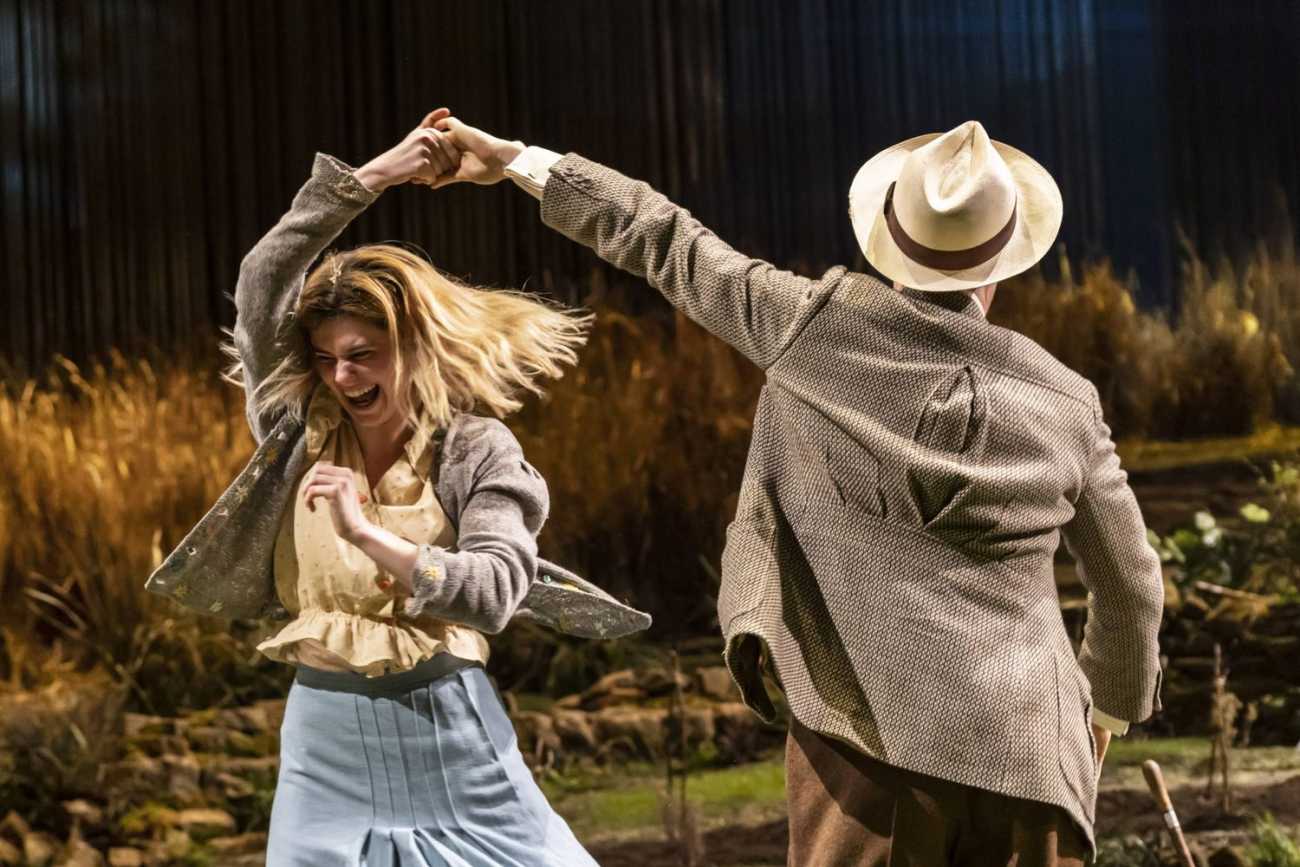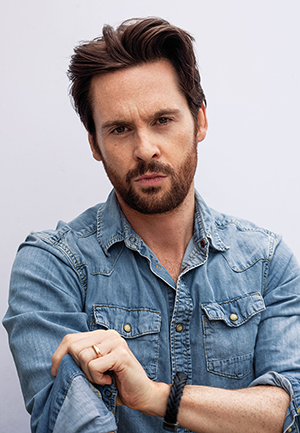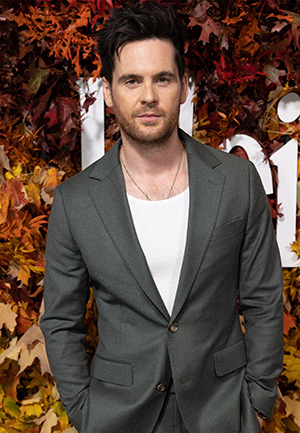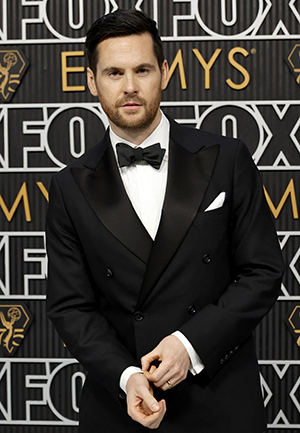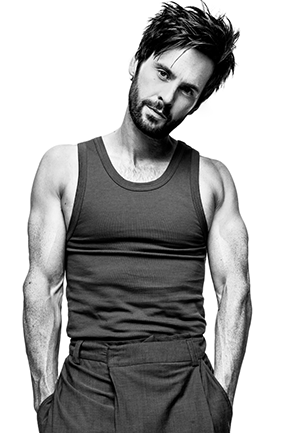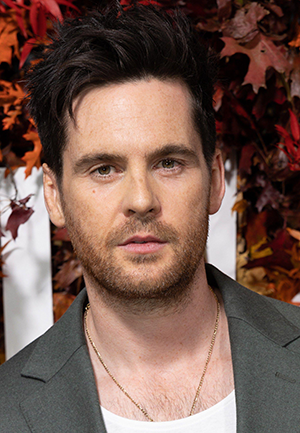After the first flush of fabulous reviews for the National Theatre's Dancing At Lughnasa following opening night last week, several more have been shared online, mainly from the weekend newspapers. I am quite intrigued at how Tom Riley's performance is described: from jokey charm to projecting Fred Astaire (who would have been popular in 1936), and am really looking forward to seeing for myself.
The cane-twirling of Fred Astaire tops off the charisma of Gerry, the caddish father of Michael, who manages to charm the boy’s mother Christina (an entrancing Alison Oliver) despite his glaring flaws. Gerry, played with begrudgingly likeable toffish charm by Tom Riley, seizes the opportunity to establish a sense of purpose by joining the Spanish civil war to fight against Franco’s forces, which would be backed by the Catholic church. Evening Standard
We see Alison Oliver’s Chris light up whenever Michael’s dad visits and Tom Riley gives him a jokey charm that it seems Louisa Harland’s lonely Agnes has also fallen for... ...These are all fine performances individually and as an excellent ensemble... British Theatre Guide
This play is very much an ensemble piece. Justine Mitchell is the buttoned-up school teacher Kate. Alison Oliver plays Chris, the one sister who has found a little love if only with a wastrel. But if anybody stands out among the women for sheer poignancy among a defeated family group it is Siobhán McSweeney as Maggie, be it when she is gently mocking herself with the aid of Cole Porter lyrics or conjuring up memories of a few moments of true happiness at competitive dances two decades earlier. When Gerry (Tom Riley) swaps partners momentarily and lifts Agnes towards the August sun, Louisa Harland manages to convey a whole alternative existence of what-might-have-beens rushing through her imagination. Plays International
Michael has been born out of wedlock to Chris (Alison Oliver), following a fling with a Welsh charmer, Gerry Evans, who reappears now and again to tease the sisters with his presence: Agnes (Louisa Harland) harbors her own affections for Gerry, whom we soon discover responds mostly to the gift of his own gab. Tom Riley plays the role with no discernible Welsh accent but with lots of peculiar affectations as if this new recruit to the Spanish civil war were instead hellbent on a career impersonating Charlie Chaplin. Chris has the measure of the man when she calls him a "bluffer", only for Gerry to appeal his cause to the adoring Agnes, whom he takes for a spin to the music of Cole Porter. Their duet to the tune of "Anything Goes" is an important dance break. The Arts Desk
But Rourke's production emphasises the warm glow of nostalgia, stained by the characters' stringent Irish wit. Mitchell catches Kate's suppressed self-loathing as the sisters' self-appointed matriarch, while McSweeney puffs on fags and cheerfully warms her bared backside on the kitchen range. And Oliver makes a neatly self-possessed young mum. But on the Olivier's arena stage, they are also obliged to play to the gallery, with Riley's Gerry projecting a Fred Astaire jollity and O'Hanlon touched (still) by the comic ghost of Father Ted. Daily Mail
At its heart are the five Mundy sisters, inspired by Friel’s own mother and aunts and brought to life with great nuance and warmth in Josie Rourke’s deft, loving production. There’s Kate, the schoolteacher and breadwinner, whose briskness in Justine Mitchell’s performance masks an aching loneliness; there’s Maggie, the joker, played with wonderful richness and quiet longing by Siobhán McSweeney; there’s Louisa Harland’s reflective and watchful Agnes; there’s Bláithín Mac Gabhann’s impulsive and mentally fragile Rose. And there’s Christina, Michael’s sweet-natured mother, who still holds a candle for his drifter father, Gerry (Tom Riley), and who, in Alison Oliver’s luminous performance, lights up like a lantern when he wanders back into their lives. Financial Times
This is a production which makes the National look secure. Josie Rourke’s sumptuous and thoughtful staging of Dancing at Lughnasa shows why this 1990 play is so loved. It is not an evening that will jolt an audience into looking at the future, perhaps not even at the present; it is likely, though, to make people consider what they have made of their pasts. The Guardian
Schoolteacher Kate (Justine Mitchell) is angular, starchy and responsible, Maggie (Siobhan McSweeney) is Woodbine-smoking and boisterous, caring Agnes (Louisa Harland) looks after the simple Rose (Blaithin Mac Gabhann) and Michael’s unmarried mother Chris (Alison Oliver) is pretty and vivacious. When Michael’s feckless father Gerry (Tom Riley) arrives after a lengthy absence, Chris succumbs to his dubious charms once again. Daily Express
Chris’s feckless sweetheart, Gerry (Tom Riley), Michael’s father, passes by for a rare visit but shows no sign of settling down with Chris or taking any responsibility for Michael. Instead, he charms the sisters and flirts with Agnes. Islington Tribune
